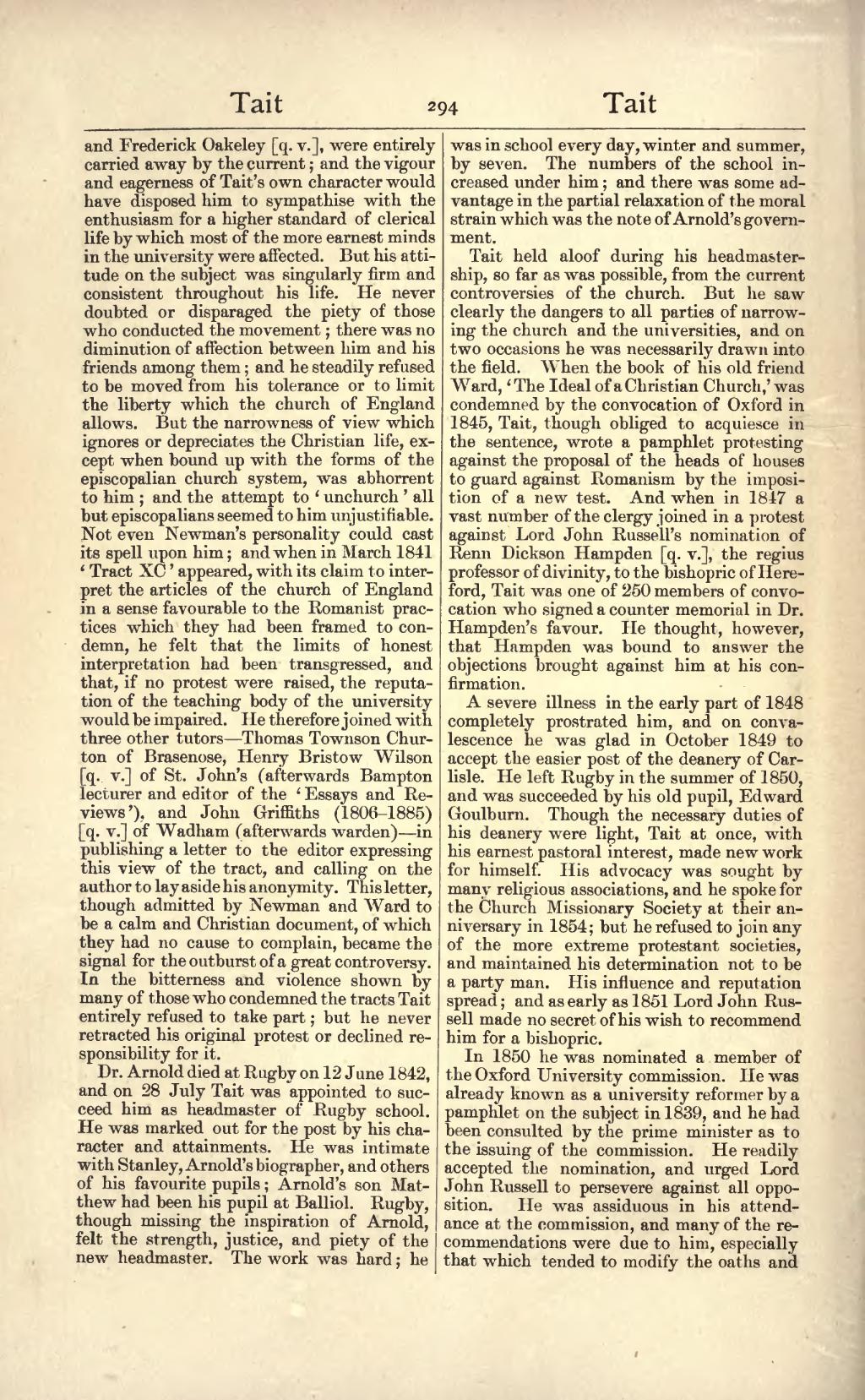and Frederick Oakeley [q. v.], were entirely carried away by the current; and the vigour and eagerness of Tait’s own character would have disposed him to sympathise with the enthusiasm for a higher standard of clerical life by which most of the more earnest minds in the university were affected. But his attitude on the subject was singularly firm and consistent throughout his life. He never doubted or disparaged the piety of those who conducted the movement; there was no diminution of affection between him and his friends among them; and he steadily refused to be moved from his tolerance or to limit the liberty which the church of England allows. But the narrowness of view which ignores or depreciates the Christian life, except when bound up with the forms of the episcopalian church system, was abhorrent to him; and the attempt to ‘unchurch’ all but episcopalians seemed to him unjustifiable. Not even Newman’s personality could cast its spell upon him; and when in March 1841 ‘Tract XC’ appeared, with its claim to interpret the articles of the church of England in a sense favourable to the Romanist practices which they had been framed to condemn, he felt that the limits of honest interpretation had been transgressed, and that, if no protest were raised, the reputation of the teaching body of the university would be impaired. He therefore joined with three other tutors—Thomas Townson Churton of Brasenose, Henry Bristow Wilson [q. v.] of St. John’s (afterwards Bampton lecturer and editor of the ‘Essays and Reviews’), and John Griffiths (1806–1885) [q. v.] of Wadham (afterwards warden) in publishing a letter to the editor expressing this view of the tract, and calling on the author to lay aside his anonymity. This letter, though admitted by Newman and Ward to be a calm and Christian document, of which they had no cause to complain, became the signal for the outburst of a great controversy. In the bitterness and violence shown by many of those who condemned the tracts Tait entirely refused to take part; but he never retracted his original protest or declined responsibility for it.
Dr. Arnold died at Rugby on 12 June 1842, and on 28 July Tait was appointed to succeed him as headmaster of Rugby school. He was marked out for the post by his character and attainments. He was intimate with Stanley, Arnold’s biographer, and others of his favourite pupils; Arnold’s son Matthew had been his pupil at Balliol. Rugby, though missing the inspiration of Arnold, felt the strength, justice, and piety of the new headmaster. The work was hard; he was in school every day, winter and summer, by seven. The numbers of the school increased under him; and there was some advantage in the partial relaxation of the moral strain which was the note of Arnold's government.
Tait held aloof during his headmastership, so far as was possible, from the current controversies of the church. But he saw clearly the dangers to all parties of narrowing the church and the universities, and on two occasions he was necessarily drawn into the field. When the book of his old friend Ward, ‘The Ideal of a Christian Church,’ was condemned by the convocation of Oxford in 1845, Tait, though obliged to acquiesce in the sentence, wrote a pamphlet protesting against the proposal of the heads of houses to guard against Romanism by the imposition of a new test. And when in 1847 a vast number of the clergy joined in a protest against Lord John Russell’s nomination of Renn Dickson Hampden [q. v.], the regius professor of divinity, to the bishopric of Hereford, Tait was one of 250 members of convocation who signed a counter memorial in Dr. Hampden’s favour. He thought, however, that Hampden was bound to answer the objections brought against him at his confirmation.
A severe illness in the early part of 1848 completely prostrated him, and on convalescence he was glad in October 1849 to accept the easier post of the deanery of Carlisle. He left Rugby in the summer of 1850, and was succeeded by his old pupil, Edward Goulburn. Though the necessary duties of his deanery were light, Tait at once, with his earnest pastoral interest, made new work for himself. His advocacy was sought by many religious associations, and he spoke for the Church Missionary Society at their anniversary in 1854; but he refused to join any of the more extreme protestant societies, and maintained his determination not to be a party man. His influence and reputation spread; and as early as 1851 Lord John Russell made no secret of his wish to recommend him for a bishopric.
In 1850 he was nominated a member of the Oxford University commission. He was already known as a university reformer by a pamphlet on the subject in 1839, and he had been consulted by the prime minister as to the issuing of the commission. He readily accepted the nomination, and urged Lord John Russell to persevere against all opposition. He was assiduous in his attendance at the commission, and many of the recommendations were due to him, especially that which tended to modify the oaths and
